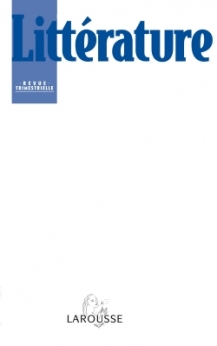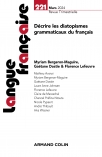
Littérature nº 170 (2/2013)
Pour acheter ce numéro, contactez-nous
Recevez les numéros de l'année en cours et accédez à l'intégralité des articles en ligne.
Connu tôt dans l’enfance et rapidement promu, dans ses textes savants, au rang de catégorie anthropologique, le vertige est l’une des limites fécondes auxquelles Caillois s’est mesuré. Des expériences du corps aux ivresses de la pensée, l’écrivain s’est souvent mis dans la situation ambiguë d’honorer le vertige, et d’en rechercher coûte que coûte l’expérience. Cette disposition au vertige, style d’être plutôt qu’objet de savoir, est un véritable parti pris : c’est la façon aventureuse et ambivalente dont cette vie a su trouver ses formes et sa propre tenue dans les choses.
Vertigo, encountered early in Caillois’ childhood and rapidly promoted, in his scholarly work, to the rank of anthropological concept, is one of those creative frontiers Caillois tested. From the experiences of the body through to intoxication with sheer thinking, the writer has often placed himself in the ambiguous position of honouring vertigo, and of seeking it out whatever the cost. This disposition to vertigo, a manner of being rather that an object of knowledge, is a true choice and a commitment: it represents the adventurous and ambivalent manner in which this life found its shapes and its way of holding itself up.

